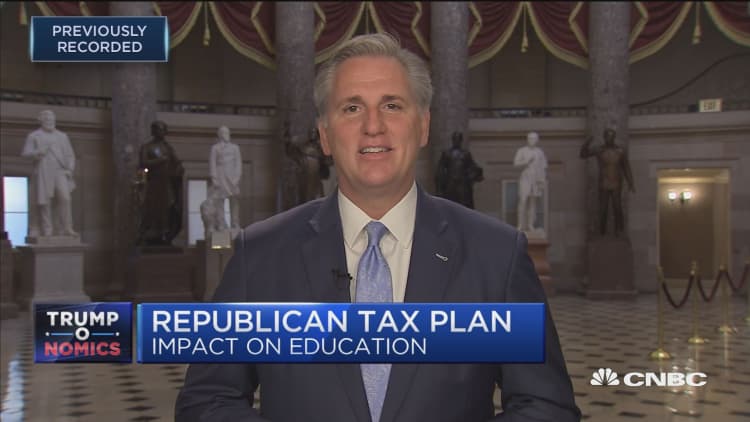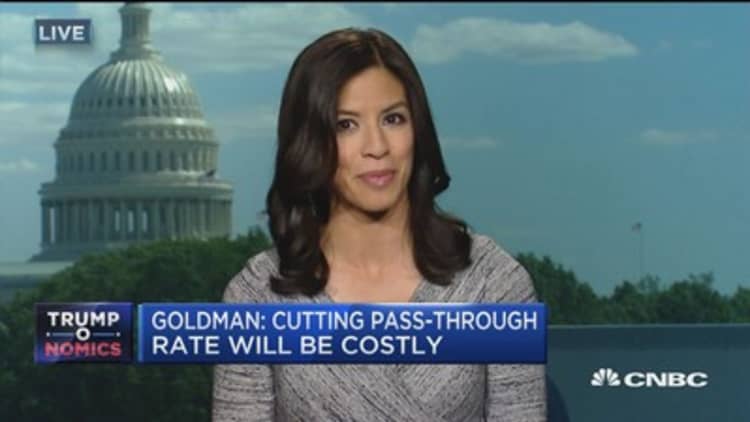Small-business owners can expect a bonanza in tax savings, thanks to the GOP's proposed tax bill. But that doesn't necessarily mean it's smart for freelancers, independent contractors and other solopreneurs to incorporate.
The Senate voted 51-49 on its version of the "Tax Cuts and Jobs Act" early Saturday morning. The 479-page bill includes an array of sweeping changes to the tax code, including the reduction of the corporate tax rate from 35 percent to 20 percent as of 2019.
Big businesses aren't the only ones who'll benefit from the tax overhaul. Small businesses — namely, pass-through entities such as S corporations and limited liability companies (LLCs) — get a break, too.
That's because under current law, profits from a small business "pass through" to the owner and is taxed at his or her individual rate, which can be as high as 39.6 percent. The Senate's bill will allow business owners to deduct 23 percent of their income, which will help them save on taxes.
Which tax proposal is better for you depends on your income level. The nature of your business also has a big impact on how you'll benefit.Tim SteffenRobert W. Baird
But don't run off and become an S-corp just yet. In exchange for those lower rates, pass-through owners may take on an even greater deal of responsibility and expense in bookkeeping and payroll needs.
"They have to make sure the benefit they get is worth the aggravation they have to deal with," said Howard Samuels, a certified public accountant at Samuels & Associates in Florham Park, New Jersey.
Here's how to register as a pass-through entity, and when it's worth considering:
Choosing an entity
Entrepreneurs like limited liability companies because they protect owners from having their personal assets seized by creditors of the business.
You can file paperwork with the state in which your business will be based, and pay anywhere between a couple hundred to a couple thousand dollars to set it up.

Though LLCs are a legal structure, they aren't recognized by the Internal Revenue Service for tax purposes. You'll need to tell the IRS how your business should be levied. To do that, you'll file a Form 8832 with the "tax man" to indicate how you'd like to be levied: as a corporation, a partnership or as part of your personal tax return.
What you choose matters. For instance, if you file as an S-corp, any profits that pass through are subject only to income taxes and not self-employment taxes of 15.3 percent. Instead, you pay your self-employment tax from your salary.
Steady profits
Business owners can start thinking about establishing an S-corp once they clear about $70,000 in annual profits after expenses from 1099 (not W-2) income, and can do so consistently, said Samuels.
They have to make sure the benefit they get is worth the aggravation they have to deal with.Howard SamuelsSamuels & Associates
That's because S-corps and multimember LLCs require extensive bookkeeping. Business owners will need to file two tax returns each year: That of the company and their own. They will also need to hire a payroll company to ensure employees are paid and taxes are properly deducted.
"How much money will you save on self-employment taxes, versus all this money that it will cost in order to set up the corporation?" asked Samuels.
Know your profession
Both the House and Senate bills have provisions related to pass-through entities. While the House calls for an income tax rate of 25 percent on these businesses, the Senate allows entrepreneurs to exclude 23 percent of their income from taxes. The remainder of the income is taxed at normal rates.
The difference is that the House bill places restrictions on which businesses can qualify for that rate — and lawyers and accountants wouldn't be able to qualify. In the Senate bill, those lawyers and accountants are prohibited from taking that 23 percent deduction unless their taxable incomes are below $250,000 if single, or below $500,000 for married couples.

Business owners ought to watch Congress' next steps to see which of these elements will ultimately make it into the final piece of legislation.
"Which tax proposal is better for you depends on your income level," said Tim Steffen, director of advanced planning at Robert W. Baird in Milwaukee. "The nature of your business also has a big impact on how you'll benefit."
More from Personal Finance:
6 year-end, pre-reform tax moves
WATCH: Cutting pass-through rate will be costly



